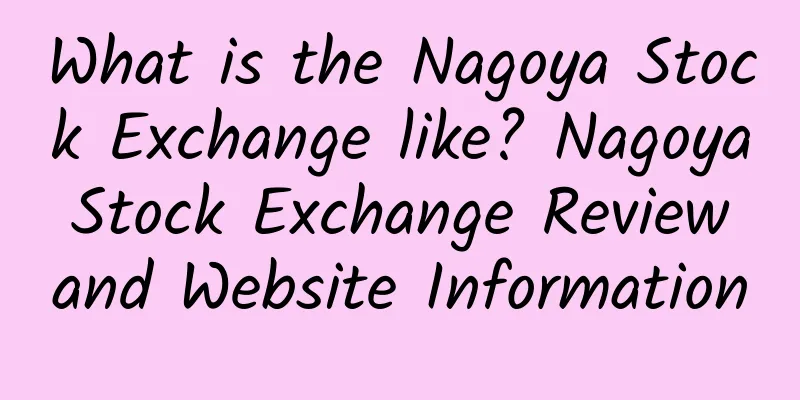What is the Nagoya Stock Exchange like? Nagoya Stock Exchange Review and Website Information

|
What is the website of Nagoya Stock Exchange? Nagoya Stock Exchange (NSE) is one of the three major stock exchanges in Japan, the other two being Tokyo Stock Exchange and Osaka Stock Exchange. It is located at 3-3-17 Sakae, Naka-ku, Nagoya, Aichi Prefecture, Japan, and was established in 1886. Website: www.nse.or.jp The Nagoya Stock Exchange (NSE) is one of the three major stock exchanges in Japan, the other two being the Tokyo Stock Exchange and the Osaka Stock Exchange. NSE is located at 3-3-17, Sakae, Naka-ku, Nagoya, Aichi Prefecture, Japan, and was established in 1886. As one of the oldest stock exchanges in Japan, the Nagoya Stock Exchange plays an important role in the Japanese financial market. The website of the Nagoya Stock Exchange is www.nse.or.jp. Through this website, investors can obtain the latest market information, trading data, announcements of listed companies and other important information related to the securities market. The NSE website is simple in design and fully functional, aiming to provide investors with convenient services to help them better understand market dynamics and make investment decisions. History of the Nagoya Stock ExchangeThe history of the Nagoya Stock Exchange can be traced back to 1886, when it was established as a local stock exchange. With the rapid development of Japan's economy, NSE has gradually become one of the important national financial markets. The establishment of the Nagoya Stock Exchange not only provides financing channels for local companies, but also provides investors with diversified investment opportunities. In the early 20th century, the Nagoya Stock Exchange, like other local stock exchanges, underwent several mergers and reorganizations. With the integration of Japan's financial market, NSE gradually became one of the important national stock exchanges. Especially after World War II, with the recovery and rapid development of the Japanese economy, the status of the Nagoya Stock Exchange was further enhanced, attracting more and more domestic and foreign investors. Market Structure of the Nagoya Stock ExchangeThe market structure of the Nagoya Stock Exchange is similar to other major stock exchanges, and is mainly divided into the Main Board Market and the Growth Enterprise Market. The Main Board Market is mainly for large enterprises, which usually have a high market value and strong profitability. The Growth Enterprise Market is mainly for small and medium-sized enterprises, which are usually in the growth stage and have great development potential. NSE also has specialized sections, such as the Nagoya Growth Market, which aims to provide a financing platform for innovative companies. The listing threshold of this section is relatively low, and it is suitable for companies with innovative technologies and business models. Through this section, the Nagoya Stock Exchange not only supports the development of local companies, but also provides investors with more investment opportunities. Nagoya Stock Exchange Trading ProductsThe Nagoya Stock Exchange has a wide variety of trading products, mainly including stocks, bonds, ETFs (Exchange Traded Funds) and REITs (Real Estate Investment Trusts), etc. Stock trading is one of the main businesses of NSE, covering multiple industries and fields, including manufacturing, services, and technology. In addition, the Nagoya Stock Exchange also provides bond trading services. As a fixed-income investment tool, bonds are favored by many conservative investors. NSE's bond market includes not only government bonds but also corporate bonds, providing investors with a variety of choices. ETF and REIT are trading products that have gradually emerged in the NSE market in recent years. ETF is a fund that tracks a specific index or asset portfolio. Investors can make diversified investments through ETF. REIT is a trust fund that invests in real estate. Investors can indirectly participate in the real estate market through REIT and enjoy real estate appreciation and rental income. Trading mechanism of Nagoya Stock ExchangeThe Nagoya Stock Exchange uses an electronic trading system to ensure fair, just and transparent trading. The trading hours of the NSE are consistent with other major stock exchanges in Japan, divided into two trading sessions: morning and afternoon. The morning trading session starts at 9:00 and ends at 11:30; the afternoon trading session starts at 12:30 and ends at 15:00. NSE's trading mechanism includes competitive trading and continuous trading. Competitive trading means that investors can submit buy and sell orders within a specific time period, and the system matches them according to the price and quantity of the orders. Continuous trading means that investors can submit buy and sell orders at any time during the trading period, and the system matches them instantly according to the market price. In order to ensure the stable operation of the market, the Nagoya Stock Exchange also has a price limit mechanism. When the price of a stock fluctuates beyond a certain range, the NSE will suspend trading of the stock to prevent excessive market fluctuations. In addition, the NSE also has a market monitoring mechanism to monitor and investigate abnormal trading behaviors to ensure market fairness and transparency. Listed companies on the Nagoya Stock ExchangeListed companies on the Nagoya Stock Exchange cover a variety of industries and fields, including manufacturing, services, and technology. Among them, manufacturing is one of the main industries of NSE listed companies, including multiple sub-industries such as automobiles, electronics, and machinery. As a global manufacturing powerhouse, Japan has many well-known manufacturing companies listed on the Nagoya Stock Exchange, such as Toyota Motor and Mitsubishi Electric. The service industry is also one of the important industries for listed companies on the Nagoya Stock Exchange, including retail, finance, medical and other sub-industries. With the transformation of Japan's economic structure, the proportion of the service industry in the national economy has gradually increased, attracting more and more service companies to be listed on the NSE. The technology industry is one of the fastest growing industries on the Nagoya Stock Exchange in recent years, including information technology, biotechnology, new energy and other sub-industries. With the continuous advancement of technological innovation, more and more technology companies are listed on the NSE, providing investors with diversified investment opportunities. Investors at the Nagoya Stock ExchangeInvestors in the Nagoya Stock Exchange mainly include individual investors and institutional investors. Individual investors refer to retail investors who invest in their own name and usually buy and sell stocks through securities companies or online trading platforms. Individual investors account for a large proportion of the NSE market and are an important source of market liquidity. Institutional investors refer to legal entities that invest in the name of institutions, including insurance companies, pension funds, investment funds, etc. Institutional investors usually have large funds and professional investment teams, and they play an important role in the NSE market. The participation of institutional investors not only improves the liquidity of the market, but also provides a stable source of funds for listed companies. In addition, the Nagoya Stock Exchange has also attracted a large number of international investors. With the opening of Japan's financial market, more and more foreign investors have entered the NSE market to trade in financial products such as stocks and bonds. The participation of international investors has not only brought more funds to the NSE market, but also enhanced the international influence of the market. Nagoya Stock Exchange Regulation and ComplianceThe supervision and compliance of the Nagoya Stock Exchange is an important guarantee to ensure the fairness, justice and transparency of the market. The regulatory agencies of the NSE mainly include the Financial Services Agency (FSA) and the Securities and Exchange Surveillance Commission (SESC). The Financial Services Agency of Japan is the highest regulatory agency of the Japanese financial market, responsible for formulating and implementing financial policies, supervising the operation of financial institutions, and maintaining the stability of the financial market. The Securities and Exchange Surveillance Commission of Japan is a subordinate agency of the Financial Services Agency of Japan, responsible for the supervision of the securities market, monitoring and investigating securities trading activities, and preventing market manipulation and fraud. The Nagoya Stock Exchange also has an internal compliance department that oversees the daily operations of the exchange and ensures that all operations comply with laws, regulations and industry standards. The NSE's compliance department not only reviews listed companies, but also monitors trading behavior to prevent illegal operations and market manipulation. The Future of the Nagoya Stock ExchangeThe future development of the Nagoya Stock Exchange faces new opportunities and challenges. As the global financial market continues to change, NSE needs to continue to innovate and reform to adapt to the new market environment. In the future, NSE will continue to promote the upgrade of the electronic trading system to improve the efficiency and security of transactions. In addition, the Nagoya Stock Exchange will strengthen its cooperation with the international financial market to attract more international investors and enterprises. Through cooperation with international stock exchanges, NSE will further enhance its international influence and become an important participant in the global financial market. In terms of listed companies, the Nagoya Stock Exchange will continue to support the development of innovative companies, especially those in the fields of science and technology and new energy. By providing a financing platform for these companies, NSE will promote the transformation and upgrading of the Japanese economy and promote sustainable development. In general, as one of the three major stock exchanges in Japan, the Nagoya Stock Exchange plays an important role in the Japanese financial market. Through continuous development and innovation, NSE will continue to provide high-quality services to investors and enterprises and promote the prosperity and development of the Japanese economy. |
<<: How is Shimizu Construction? Shimizu Construction reviews and website information
>>: How is the Finnish Sampo Group? Finnish Sampo Group reviews and website information
Recommend
How to open the pine nut? What are the benefits of eating open pine nuts?
Open pine nuts are one of the most popular nuts t...
How is the University of New England in the United States? Evaluation and website information of the University of New England in the United States
What is the website of the University of New Engla...
What can corn flour do? How to make corn flour delicious
Corn flour is quite common, but in the eyes of so...
How is Canoe.com? Canoe.com review and website information
What is Canoe.com? Canoe.com is a mainstream media...
How is Astro Group? Astro Group reviews and website information
What is Astro Group? Astro Group (Astro Holdings S...
How is Venezuela Agricultural TV? Venezuela Agricultural TV reviews and website information
What is the website of Venezuelan Agricultural TV?...
The difference between honeydew melon and cantaloupe
Honeydew melon and Hami melon are both delicious ...
What is Waste Management Company like? Waste Management Company Reviews and Website Information
What is the website of Waste Management? Waste Man...
How to make sea cucumber celery porridge
Do you understand how to make sea cucumber and ce...
The efficacy and function of pig liver porridge
How much do you know about the effects and functio...
What is the Community of Portuguese-Speaking Countries like? Reviews and website information of the Community of Portuguese-Speaking Countries
What is the website of the Community of Portuguese...
What fruits are rich in vitamin A?
Vitamin A is a nutrient necessary for the normal ...
How is the University of California? University of California reviews and website information
What is the website of University of California? T...
The efficacy and function of snapdragon The medicinal value of snapdragon
Snapdragon is the most popular beautiful ornament...
How to eat marigold and what to drink with marigold
Huai Shou Ju is a beautiful ornamental plant and ...









